Consumer Behavior in Tourism: Trends, Decision Making & Perceptions
VerifiedAdded on 2023/06/11
|8
|2077
|193
Report
AI Summary
This report examines consumer behavior within the tourism and business management industry, focusing on Premier Inn as a case study. It explores contemporary perspectives on consumption, highlighting the role of accommodation, food services, and entertainment. The report analyzes individual decision-making processes, influenced by factors like income, peer reviews, and cultural background. It emphasizes the importance of perceptual processes in understanding consumer needs and brand image. Different types of consumers, such as need-based, faithful, and potential customers, are identified. Future trends, including the demand for transparency and online purchasing, are discussed, along with the theory of consumer behavior, considering psychological, personal, and social factors that influence purchasing decisions. The study concludes by underscoring the importance of these factors in shaping consumer behavior in the tourism sector.
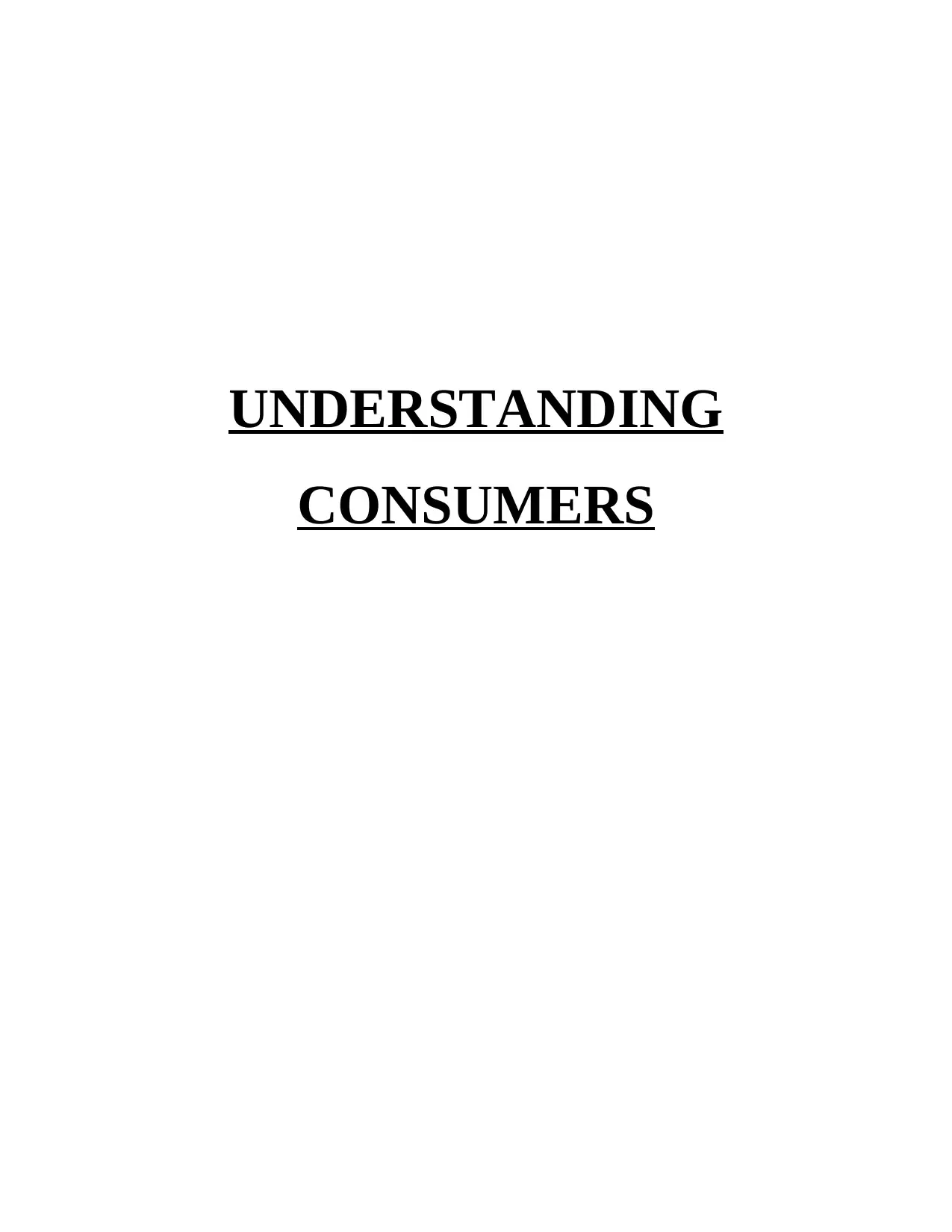
UNDERSTANDING
CONSUMERS
CONSUMERS
Paraphrase This Document
Need a fresh take? Get an instant paraphrase of this document with our AI Paraphraser
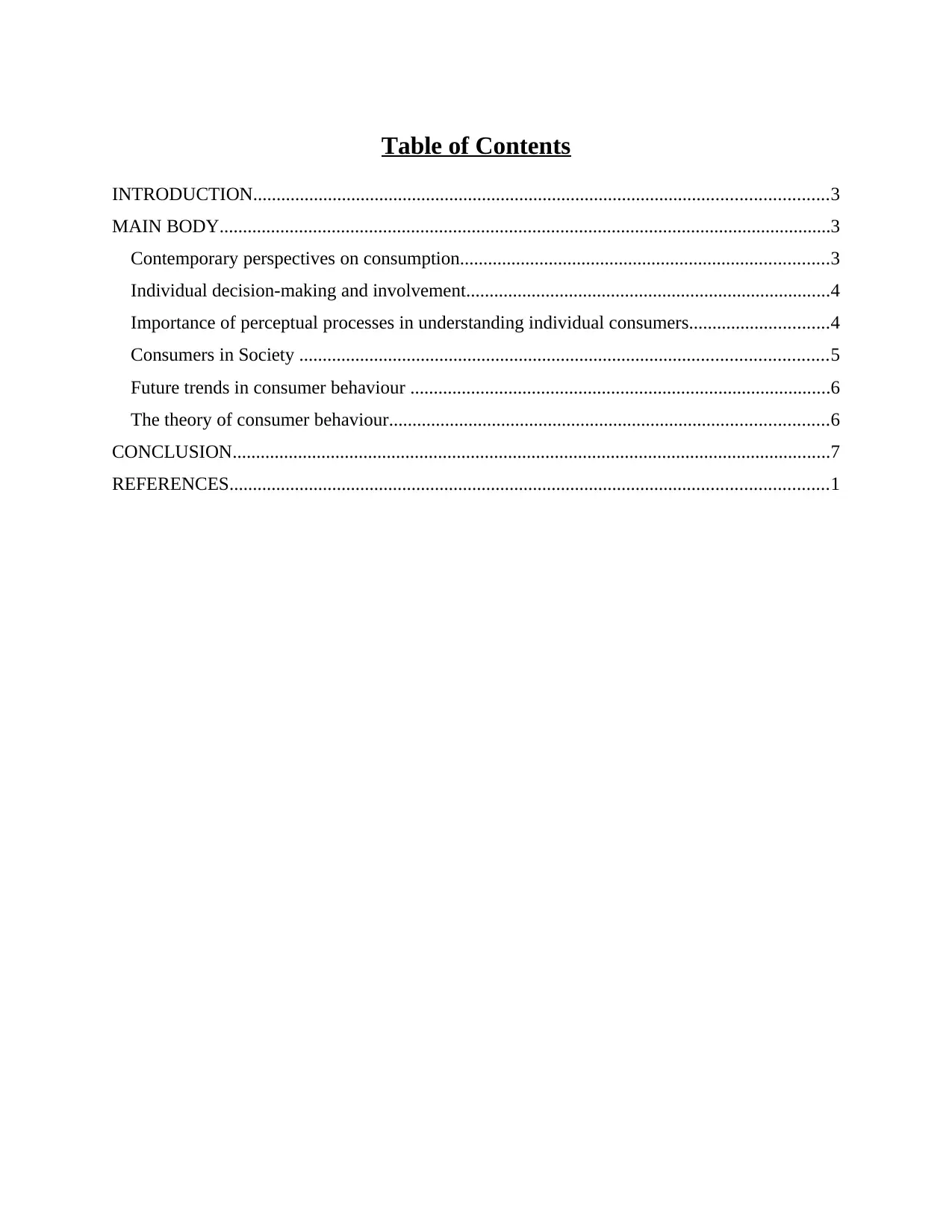
Table of Contents
INTRODUCTION...........................................................................................................................3
MAIN BODY...................................................................................................................................3
Contemporary perspectives on consumption...............................................................................3
Individual decision-making and involvement..............................................................................4
Importance of perceptual processes in understanding individual consumers..............................4
Consumers in Society .................................................................................................................5
Future trends in consumer behaviour ..........................................................................................6
The theory of consumer behaviour..............................................................................................6
CONCLUSION................................................................................................................................7
REFERENCES................................................................................................................................1
INTRODUCTION...........................................................................................................................3
MAIN BODY...................................................................................................................................3
Contemporary perspectives on consumption...............................................................................3
Individual decision-making and involvement..............................................................................4
Importance of perceptual processes in understanding individual consumers..............................4
Consumers in Society .................................................................................................................5
Future trends in consumer behaviour ..........................................................................................6
The theory of consumer behaviour..............................................................................................6
CONCLUSION................................................................................................................................7
REFERENCES................................................................................................................................1
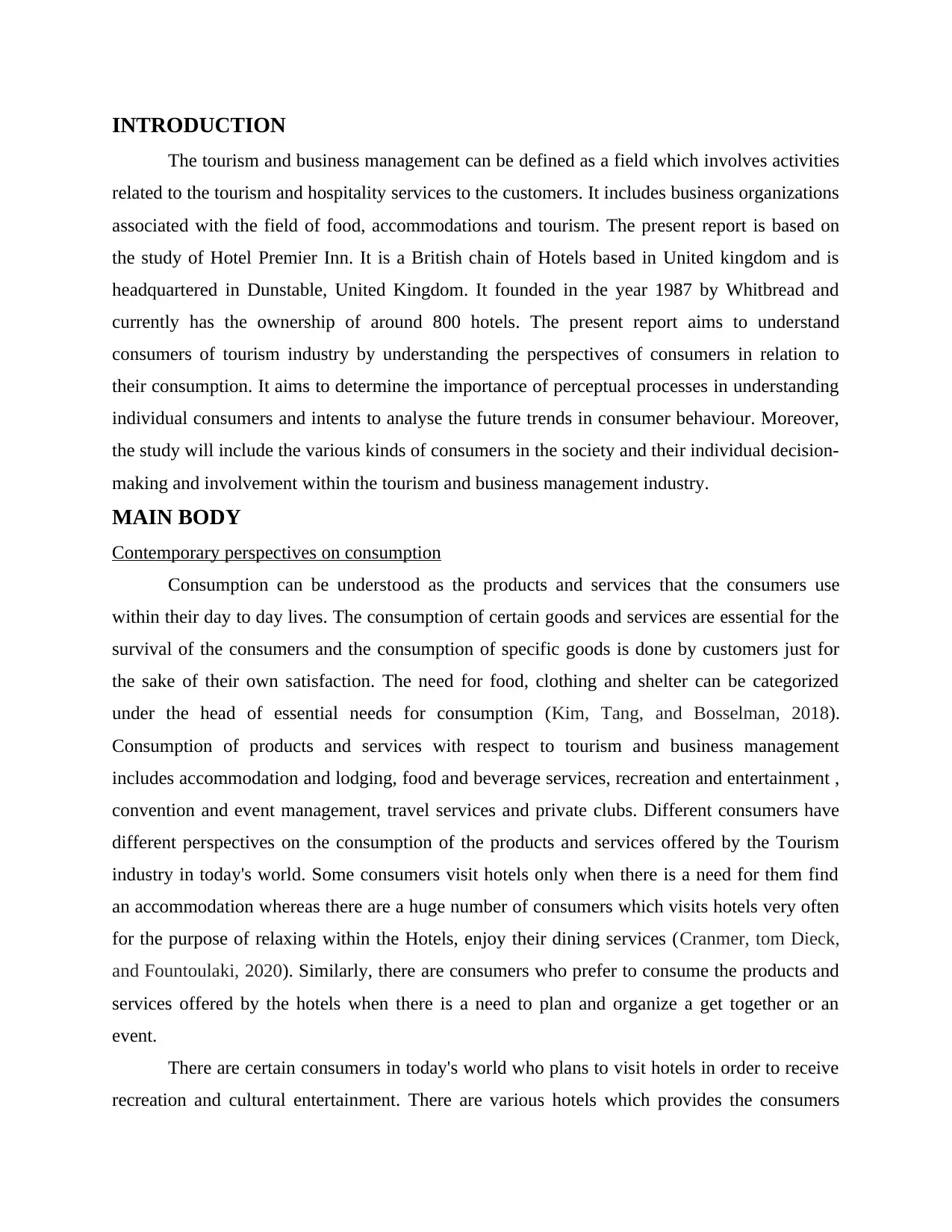
INTRODUCTION
The tourism and business management can be defined as a field which involves activities
related to the tourism and hospitality services to the customers. It includes business organizations
associated with the field of food, accommodations and tourism. The present report is based on
the study of Hotel Premier Inn. It is a British chain of Hotels based in United kingdom and is
headquartered in Dunstable, United Kingdom. It founded in the year 1987 by Whitbread and
currently has the ownership of around 800 hotels. The present report aims to understand
consumers of tourism industry by understanding the perspectives of consumers in relation to
their consumption. It aims to determine the importance of perceptual processes in understanding
individual consumers and intents to analyse the future trends in consumer behaviour. Moreover,
the study will include the various kinds of consumers in the society and their individual decision-
making and involvement within the tourism and business management industry.
MAIN BODY
Contemporary perspectives on consumption
Consumption can be understood as the products and services that the consumers use
within their day to day lives. The consumption of certain goods and services are essential for the
survival of the consumers and the consumption of specific goods is done by customers just for
the sake of their own satisfaction. The need for food, clothing and shelter can be categorized
under the head of essential needs for consumption (Kim, Tang, and Bosselman, 2018).
Consumption of products and services with respect to tourism and business management
includes accommodation and lodging, food and beverage services, recreation and entertainment ,
convention and event management, travel services and private clubs. Different consumers have
different perspectives on the consumption of the products and services offered by the Tourism
industry in today's world. Some consumers visit hotels only when there is a need for them find
an accommodation whereas there are a huge number of consumers which visits hotels very often
for the purpose of relaxing within the Hotels, enjoy their dining services (Cranmer, tom Dieck,
and Fountoulaki, 2020). Similarly, there are consumers who prefer to consume the products and
services offered by the hotels when there is a need to plan and organize a get together or an
event.
There are certain consumers in today's world who plans to visit hotels in order to receive
recreation and cultural entertainment. There are various hotels which provides the consumers
The tourism and business management can be defined as a field which involves activities
related to the tourism and hospitality services to the customers. It includes business organizations
associated with the field of food, accommodations and tourism. The present report is based on
the study of Hotel Premier Inn. It is a British chain of Hotels based in United kingdom and is
headquartered in Dunstable, United Kingdom. It founded in the year 1987 by Whitbread and
currently has the ownership of around 800 hotels. The present report aims to understand
consumers of tourism industry by understanding the perspectives of consumers in relation to
their consumption. It aims to determine the importance of perceptual processes in understanding
individual consumers and intents to analyse the future trends in consumer behaviour. Moreover,
the study will include the various kinds of consumers in the society and their individual decision-
making and involvement within the tourism and business management industry.
MAIN BODY
Contemporary perspectives on consumption
Consumption can be understood as the products and services that the consumers use
within their day to day lives. The consumption of certain goods and services are essential for the
survival of the consumers and the consumption of specific goods is done by customers just for
the sake of their own satisfaction. The need for food, clothing and shelter can be categorized
under the head of essential needs for consumption (Kim, Tang, and Bosselman, 2018).
Consumption of products and services with respect to tourism and business management
includes accommodation and lodging, food and beverage services, recreation and entertainment ,
convention and event management, travel services and private clubs. Different consumers have
different perspectives on the consumption of the products and services offered by the Tourism
industry in today's world. Some consumers visit hotels only when there is a need for them find
an accommodation whereas there are a huge number of consumers which visits hotels very often
for the purpose of relaxing within the Hotels, enjoy their dining services (Cranmer, tom Dieck,
and Fountoulaki, 2020). Similarly, there are consumers who prefer to consume the products and
services offered by the hotels when there is a need to plan and organize a get together or an
event.
There are certain consumers in today's world who plans to visit hotels in order to receive
recreation and cultural entertainment. There are various hotels which provides the consumers
⊘ This is a preview!⊘
Do you want full access?
Subscribe today to unlock all pages.

Trusted by 1+ million students worldwide
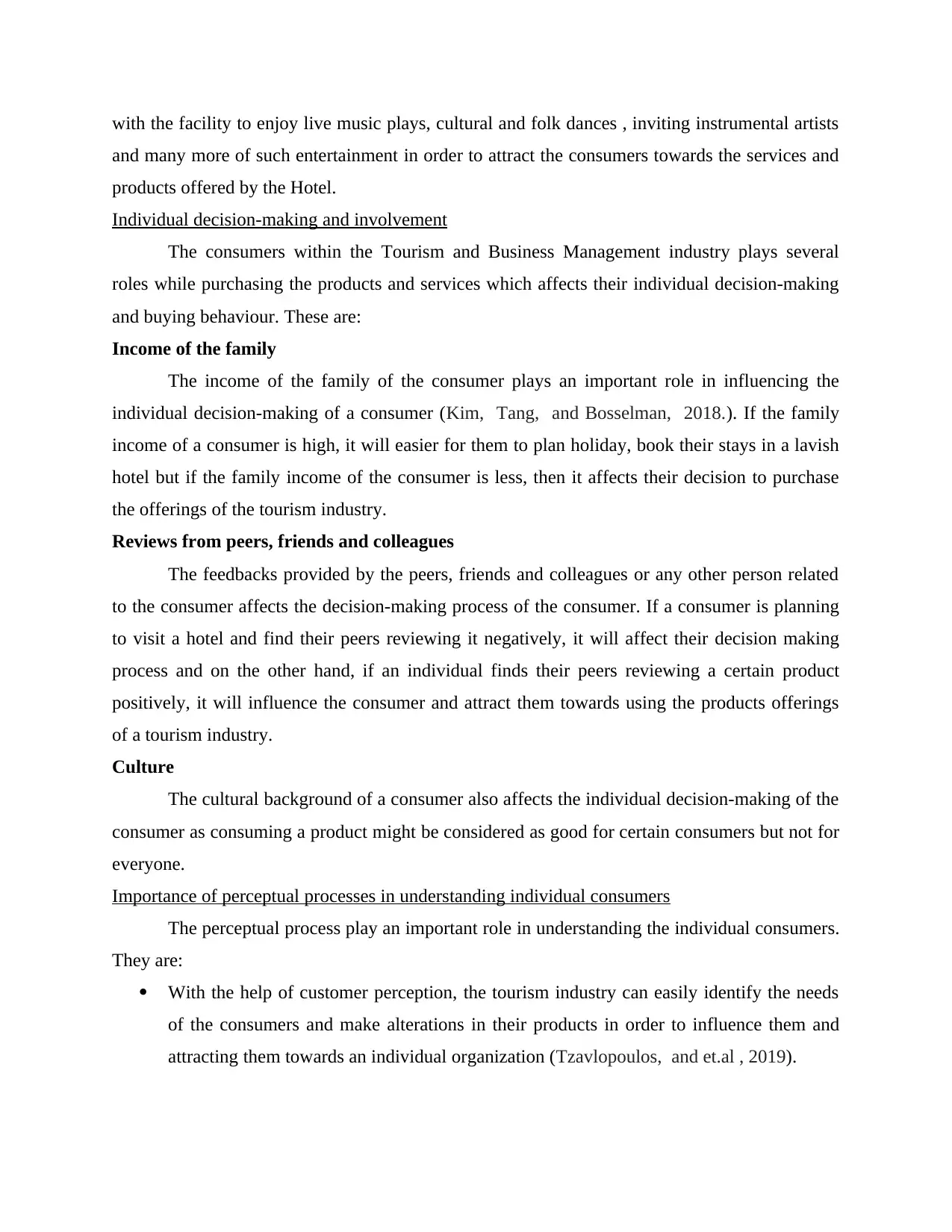
with the facility to enjoy live music plays, cultural and folk dances , inviting instrumental artists
and many more of such entertainment in order to attract the consumers towards the services and
products offered by the Hotel.
Individual decision-making and involvement
The consumers within the Tourism and Business Management industry plays several
roles while purchasing the products and services which affects their individual decision-making
and buying behaviour. These are:
Income of the family
The income of the family of the consumer plays an important role in influencing the
individual decision-making of a consumer (Kim, Tang, and Bosselman, 2018.). If the family
income of a consumer is high, it will easier for them to plan holiday, book their stays in a lavish
hotel but if the family income of the consumer is less, then it affects their decision to purchase
the offerings of the tourism industry.
Reviews from peers, friends and colleagues
The feedbacks provided by the peers, friends and colleagues or any other person related
to the consumer affects the decision-making process of the consumer. If a consumer is planning
to visit a hotel and find their peers reviewing it negatively, it will affect their decision making
process and on the other hand, if an individual finds their peers reviewing a certain product
positively, it will influence the consumer and attract them towards using the products offerings
of a tourism industry.
Culture
The cultural background of a consumer also affects the individual decision-making of the
consumer as consuming a product might be considered as good for certain consumers but not for
everyone.
Importance of perceptual processes in understanding individual consumers
The perceptual process play an important role in understanding the individual consumers.
They are:
With the help of customer perception, the tourism industry can easily identify the needs
of the consumers and make alterations in their products in order to influence them and
attracting them towards an individual organization (Tzavlopoulos, and et.al , 2019).
and many more of such entertainment in order to attract the consumers towards the services and
products offered by the Hotel.
Individual decision-making and involvement
The consumers within the Tourism and Business Management industry plays several
roles while purchasing the products and services which affects their individual decision-making
and buying behaviour. These are:
Income of the family
The income of the family of the consumer plays an important role in influencing the
individual decision-making of a consumer (Kim, Tang, and Bosselman, 2018.). If the family
income of a consumer is high, it will easier for them to plan holiday, book their stays in a lavish
hotel but if the family income of the consumer is less, then it affects their decision to purchase
the offerings of the tourism industry.
Reviews from peers, friends and colleagues
The feedbacks provided by the peers, friends and colleagues or any other person related
to the consumer affects the decision-making process of the consumer. If a consumer is planning
to visit a hotel and find their peers reviewing it negatively, it will affect their decision making
process and on the other hand, if an individual finds their peers reviewing a certain product
positively, it will influence the consumer and attract them towards using the products offerings
of a tourism industry.
Culture
The cultural background of a consumer also affects the individual decision-making of the
consumer as consuming a product might be considered as good for certain consumers but not for
everyone.
Importance of perceptual processes in understanding individual consumers
The perceptual process play an important role in understanding the individual consumers.
They are:
With the help of customer perception, the tourism industry can easily identify the needs
of the consumers and make alterations in their products in order to influence them and
attracting them towards an individual organization (Tzavlopoulos, and et.al , 2019).
Paraphrase This Document
Need a fresh take? Get an instant paraphrase of this document with our AI Paraphraser
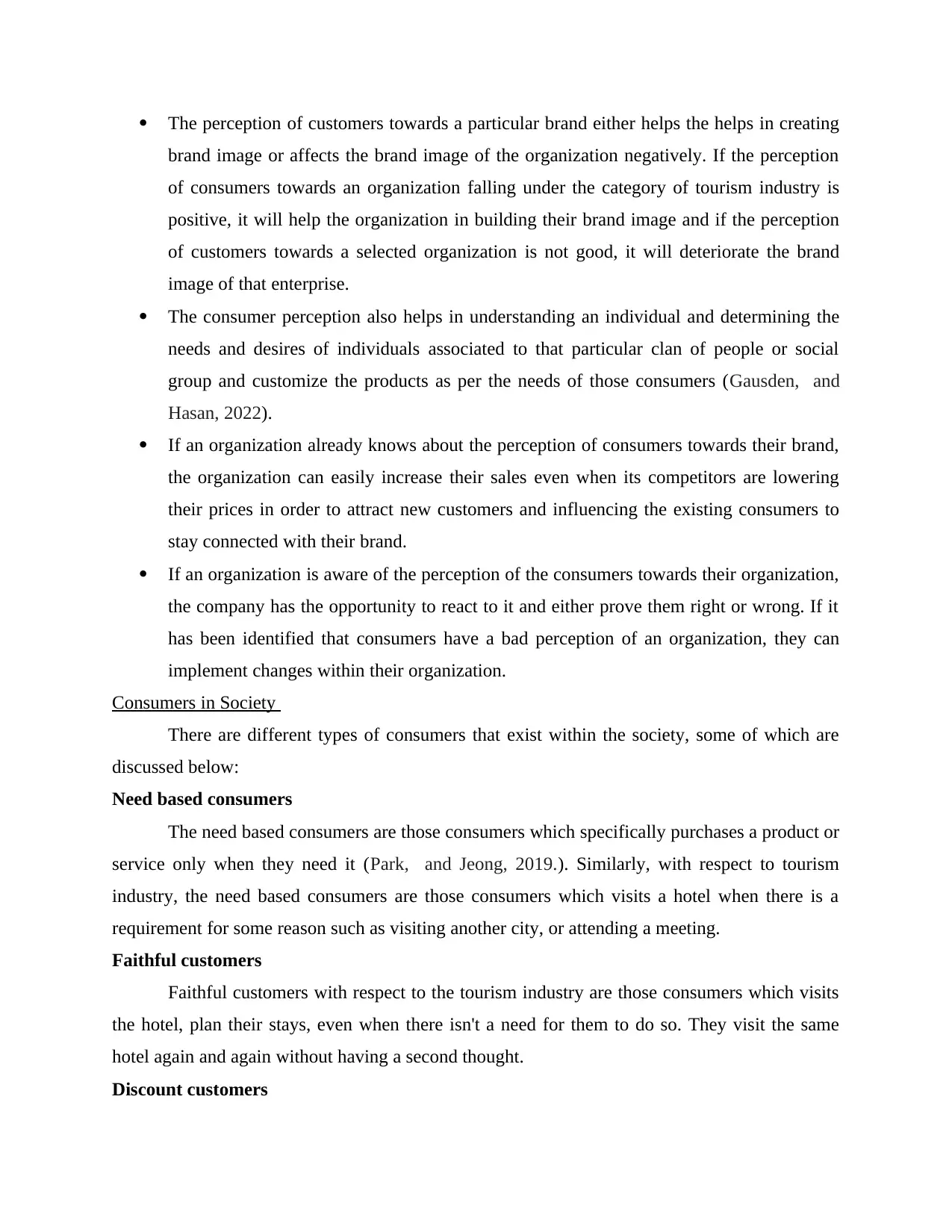
The perception of customers towards a particular brand either helps the helps in creating
brand image or affects the brand image of the organization negatively. If the perception
of consumers towards an organization falling under the category of tourism industry is
positive, it will help the organization in building their brand image and if the perception
of customers towards a selected organization is not good, it will deteriorate the brand
image of that enterprise.
The consumer perception also helps in understanding an individual and determining the
needs and desires of individuals associated to that particular clan of people or social
group and customize the products as per the needs of those consumers (Gausden, and
Hasan, 2022).
If an organization already knows about the perception of consumers towards their brand,
the organization can easily increase their sales even when its competitors are lowering
their prices in order to attract new customers and influencing the existing consumers to
stay connected with their brand.
If an organization is aware of the perception of the consumers towards their organization,
the company has the opportunity to react to it and either prove them right or wrong. If it
has been identified that consumers have a bad perception of an organization, they can
implement changes within their organization.
Consumers in Society
There are different types of consumers that exist within the society, some of which are
discussed below:
Need based consumers
The need based consumers are those consumers which specifically purchases a product or
service only when they need it (Park, and Jeong, 2019.). Similarly, with respect to tourism
industry, the need based consumers are those consumers which visits a hotel when there is a
requirement for some reason such as visiting another city, or attending a meeting.
Faithful customers
Faithful customers with respect to the tourism industry are those consumers which visits
the hotel, plan their stays, even when there isn't a need for them to do so. They visit the same
hotel again and again without having a second thought.
Discount customers
brand image or affects the brand image of the organization negatively. If the perception
of consumers towards an organization falling under the category of tourism industry is
positive, it will help the organization in building their brand image and if the perception
of customers towards a selected organization is not good, it will deteriorate the brand
image of that enterprise.
The consumer perception also helps in understanding an individual and determining the
needs and desires of individuals associated to that particular clan of people or social
group and customize the products as per the needs of those consumers (Gausden, and
Hasan, 2022).
If an organization already knows about the perception of consumers towards their brand,
the organization can easily increase their sales even when its competitors are lowering
their prices in order to attract new customers and influencing the existing consumers to
stay connected with their brand.
If an organization is aware of the perception of the consumers towards their organization,
the company has the opportunity to react to it and either prove them right or wrong. If it
has been identified that consumers have a bad perception of an organization, they can
implement changes within their organization.
Consumers in Society
There are different types of consumers that exist within the society, some of which are
discussed below:
Need based consumers
The need based consumers are those consumers which specifically purchases a product or
service only when they need it (Park, and Jeong, 2019.). Similarly, with respect to tourism
industry, the need based consumers are those consumers which visits a hotel when there is a
requirement for some reason such as visiting another city, or attending a meeting.
Faithful customers
Faithful customers with respect to the tourism industry are those consumers which visits
the hotel, plan their stays, even when there isn't a need for them to do so. They visit the same
hotel again and again without having a second thought.
Discount customers
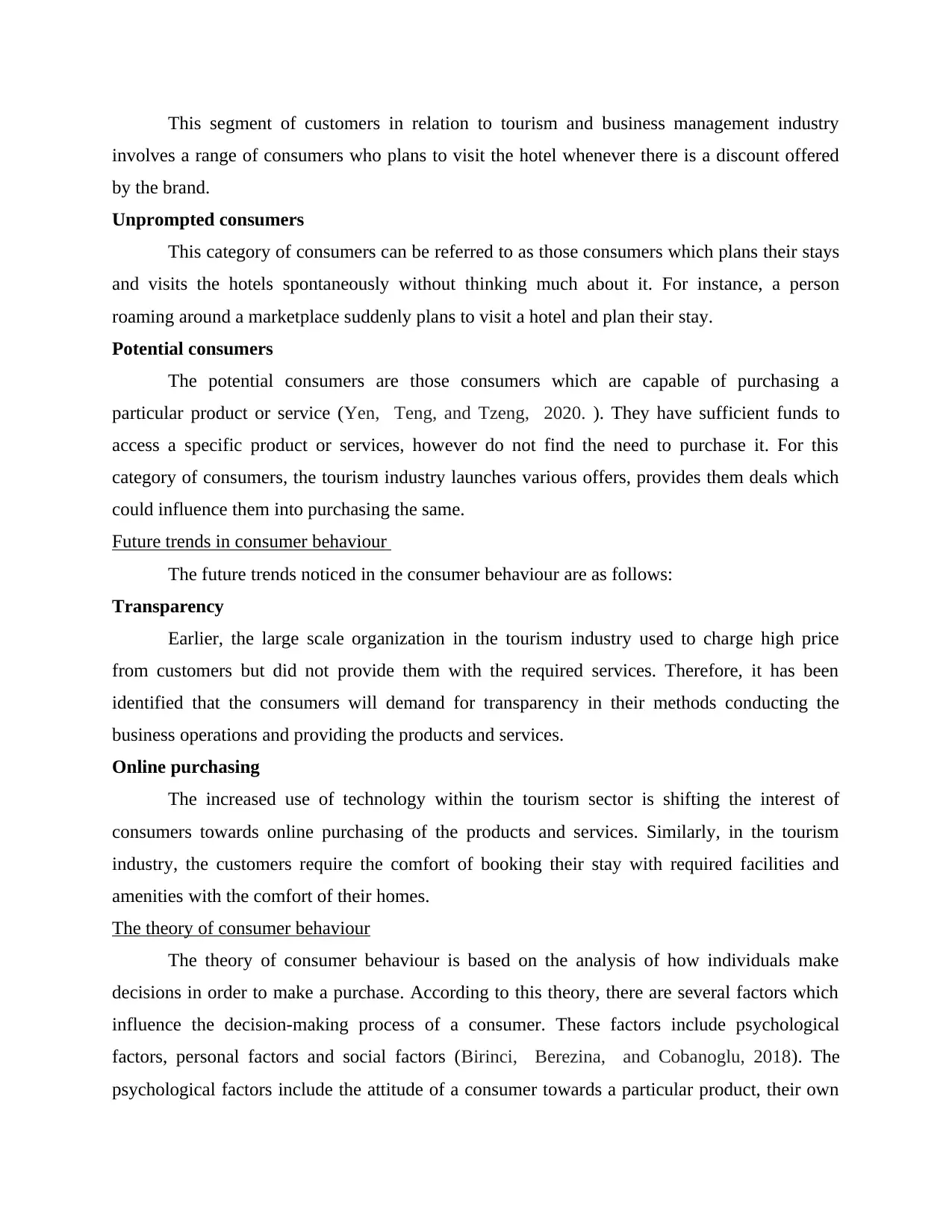
This segment of customers in relation to tourism and business management industry
involves a range of consumers who plans to visit the hotel whenever there is a discount offered
by the brand.
Unprompted consumers
This category of consumers can be referred to as those consumers which plans their stays
and visits the hotels spontaneously without thinking much about it. For instance, a person
roaming around a marketplace suddenly plans to visit a hotel and plan their stay.
Potential consumers
The potential consumers are those consumers which are capable of purchasing a
particular product or service (Yen, Teng, and Tzeng, 2020. ). They have sufficient funds to
access a specific product or services, however do not find the need to purchase it. For this
category of consumers, the tourism industry launches various offers, provides them deals which
could influence them into purchasing the same.
Future trends in consumer behaviour
The future trends noticed in the consumer behaviour are as follows:
Transparency
Earlier, the large scale organization in the tourism industry used to charge high price
from customers but did not provide them with the required services. Therefore, it has been
identified that the consumers will demand for transparency in their methods conducting the
business operations and providing the products and services.
Online purchasing
The increased use of technology within the tourism sector is shifting the interest of
consumers towards online purchasing of the products and services. Similarly, in the tourism
industry, the customers require the comfort of booking their stay with required facilities and
amenities with the comfort of their homes.
The theory of consumer behaviour
The theory of consumer behaviour is based on the analysis of how individuals make
decisions in order to make a purchase. According to this theory, there are several factors which
influence the decision-making process of a consumer. These factors include psychological
factors, personal factors and social factors (Birinci, Berezina, and Cobanoglu, 2018). The
psychological factors include the attitude of a consumer towards a particular product, their own
involves a range of consumers who plans to visit the hotel whenever there is a discount offered
by the brand.
Unprompted consumers
This category of consumers can be referred to as those consumers which plans their stays
and visits the hotels spontaneously without thinking much about it. For instance, a person
roaming around a marketplace suddenly plans to visit a hotel and plan their stay.
Potential consumers
The potential consumers are those consumers which are capable of purchasing a
particular product or service (Yen, Teng, and Tzeng, 2020. ). They have sufficient funds to
access a specific product or services, however do not find the need to purchase it. For this
category of consumers, the tourism industry launches various offers, provides them deals which
could influence them into purchasing the same.
Future trends in consumer behaviour
The future trends noticed in the consumer behaviour are as follows:
Transparency
Earlier, the large scale organization in the tourism industry used to charge high price
from customers but did not provide them with the required services. Therefore, it has been
identified that the consumers will demand for transparency in their methods conducting the
business operations and providing the products and services.
Online purchasing
The increased use of technology within the tourism sector is shifting the interest of
consumers towards online purchasing of the products and services. Similarly, in the tourism
industry, the customers require the comfort of booking their stay with required facilities and
amenities with the comfort of their homes.
The theory of consumer behaviour
The theory of consumer behaviour is based on the analysis of how individuals make
decisions in order to make a purchase. According to this theory, there are several factors which
influence the decision-making process of a consumer. These factors include psychological
factors, personal factors and social factors (Birinci, Berezina, and Cobanoglu, 2018). The
psychological factors include the attitude of a consumer towards a particular product, their own
⊘ This is a preview!⊘
Do you want full access?
Subscribe today to unlock all pages.

Trusted by 1+ million students worldwide
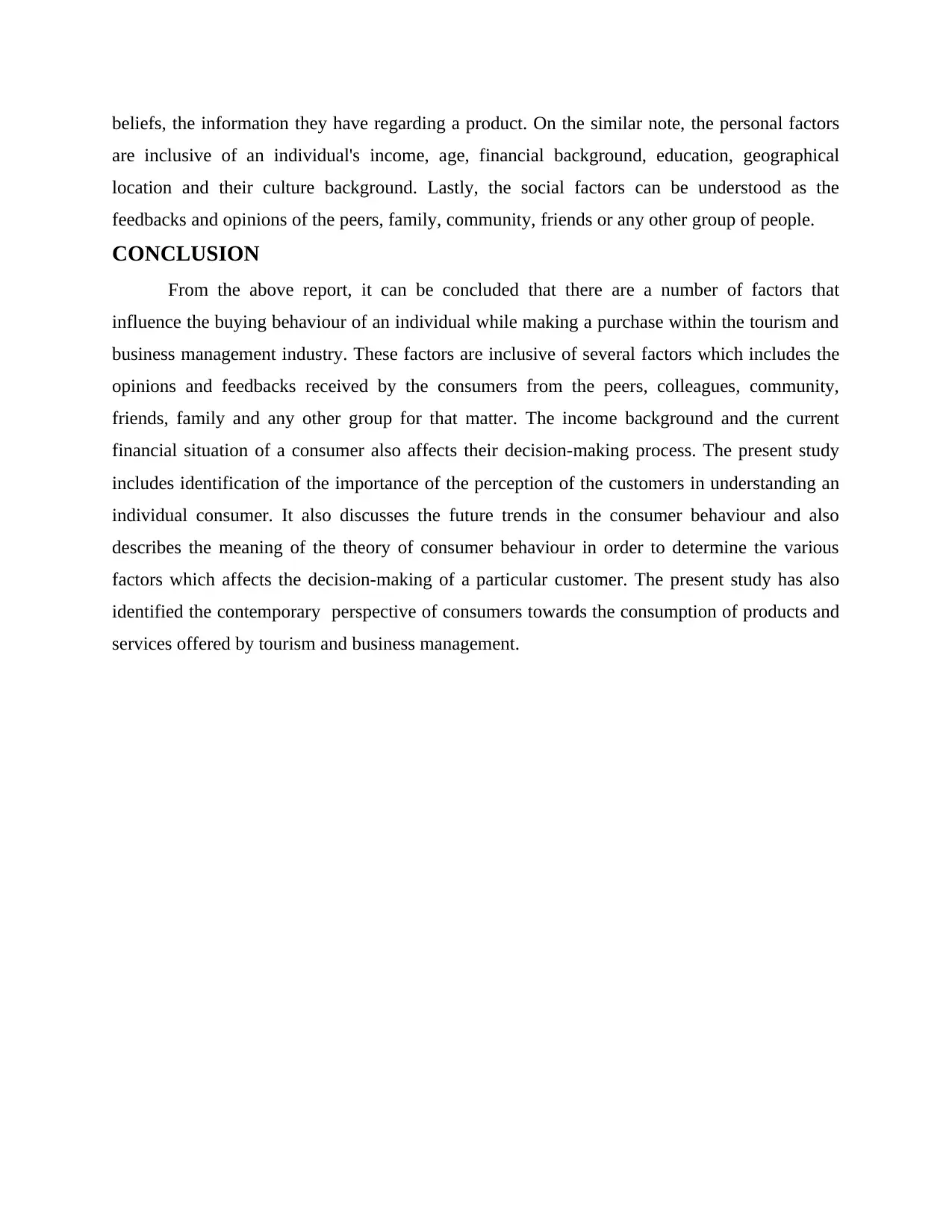
beliefs, the information they have regarding a product. On the similar note, the personal factors
are inclusive of an individual's income, age, financial background, education, geographical
location and their culture background. Lastly, the social factors can be understood as the
feedbacks and opinions of the peers, family, community, friends or any other group of people.
CONCLUSION
From the above report, it can be concluded that there are a number of factors that
influence the buying behaviour of an individual while making a purchase within the tourism and
business management industry. These factors are inclusive of several factors which includes the
opinions and feedbacks received by the consumers from the peers, colleagues, community,
friends, family and any other group for that matter. The income background and the current
financial situation of a consumer also affects their decision-making process. The present study
includes identification of the importance of the perception of the customers in understanding an
individual consumer. It also discusses the future trends in the consumer behaviour and also
describes the meaning of the theory of consumer behaviour in order to determine the various
factors which affects the decision-making of a particular customer. The present study has also
identified the contemporary perspective of consumers towards the consumption of products and
services offered by tourism and business management.
are inclusive of an individual's income, age, financial background, education, geographical
location and their culture background. Lastly, the social factors can be understood as the
feedbacks and opinions of the peers, family, community, friends or any other group of people.
CONCLUSION
From the above report, it can be concluded that there are a number of factors that
influence the buying behaviour of an individual while making a purchase within the tourism and
business management industry. These factors are inclusive of several factors which includes the
opinions and feedbacks received by the consumers from the peers, colleagues, community,
friends, family and any other group for that matter. The income background and the current
financial situation of a consumer also affects their decision-making process. The present study
includes identification of the importance of the perception of the customers in understanding an
individual consumer. It also discusses the future trends in the consumer behaviour and also
describes the meaning of the theory of consumer behaviour in order to determine the various
factors which affects the decision-making of a particular customer. The present study has also
identified the contemporary perspective of consumers towards the consumption of products and
services offered by tourism and business management.
Paraphrase This Document
Need a fresh take? Get an instant paraphrase of this document with our AI Paraphraser
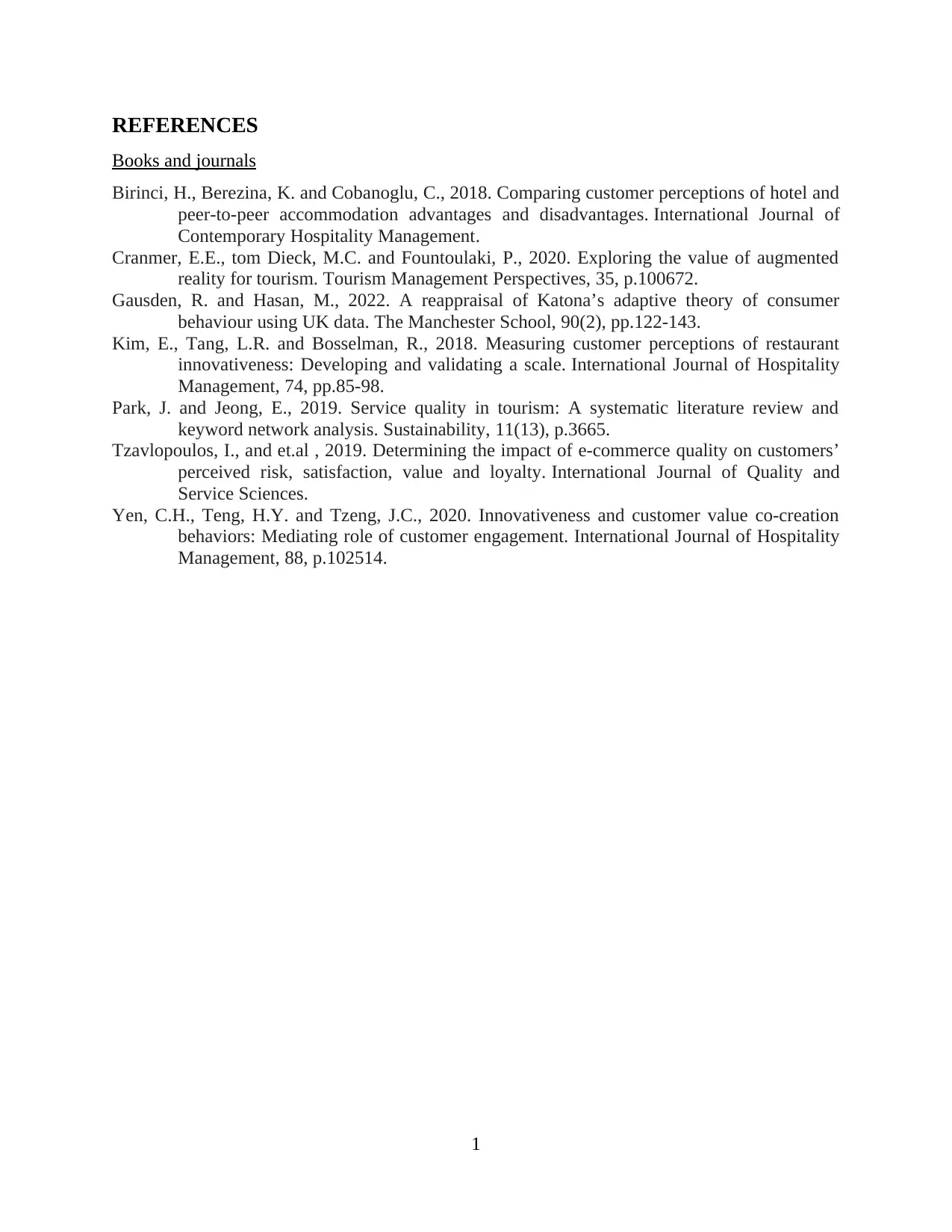
REFERENCES
Books and journals
Birinci, H., Berezina, K. and Cobanoglu, C., 2018. Comparing customer perceptions of hotel and
peer-to-peer accommodation advantages and disadvantages. International Journal of
Contemporary Hospitality Management.
Cranmer, E.E., tom Dieck, M.C. and Fountoulaki, P., 2020. Exploring the value of augmented
reality for tourism. Tourism Management Perspectives, 35, p.100672.
Gausden, R. and Hasan, M., 2022. A reappraisal of Katona’s adaptive theory of consumer
behaviour using UK data. The Manchester School, 90(2), pp.122-143.
Kim, E., Tang, L.R. and Bosselman, R., 2018. Measuring customer perceptions of restaurant
innovativeness: Developing and validating a scale. International Journal of Hospitality
Management, 74, pp.85-98.
Park, J. and Jeong, E., 2019. Service quality in tourism: A systematic literature review and
keyword network analysis. Sustainability, 11(13), p.3665.
Tzavlopoulos, Ι., and et.al , 2019. Determining the impact of e-commerce quality on customers’
perceived risk, satisfaction, value and loyalty. International Journal of Quality and
Service Sciences.
Yen, C.H., Teng, H.Y. and Tzeng, J.C., 2020. Innovativeness and customer value co-creation
behaviors: Mediating role of customer engagement. International Journal of Hospitality
Management, 88, p.102514.
1
Books and journals
Birinci, H., Berezina, K. and Cobanoglu, C., 2018. Comparing customer perceptions of hotel and
peer-to-peer accommodation advantages and disadvantages. International Journal of
Contemporary Hospitality Management.
Cranmer, E.E., tom Dieck, M.C. and Fountoulaki, P., 2020. Exploring the value of augmented
reality for tourism. Tourism Management Perspectives, 35, p.100672.
Gausden, R. and Hasan, M., 2022. A reappraisal of Katona’s adaptive theory of consumer
behaviour using UK data. The Manchester School, 90(2), pp.122-143.
Kim, E., Tang, L.R. and Bosselman, R., 2018. Measuring customer perceptions of restaurant
innovativeness: Developing and validating a scale. International Journal of Hospitality
Management, 74, pp.85-98.
Park, J. and Jeong, E., 2019. Service quality in tourism: A systematic literature review and
keyword network analysis. Sustainability, 11(13), p.3665.
Tzavlopoulos, Ι., and et.al , 2019. Determining the impact of e-commerce quality on customers’
perceived risk, satisfaction, value and loyalty. International Journal of Quality and
Service Sciences.
Yen, C.H., Teng, H.Y. and Tzeng, J.C., 2020. Innovativeness and customer value co-creation
behaviors: Mediating role of customer engagement. International Journal of Hospitality
Management, 88, p.102514.
1
1 out of 8
Related Documents
Your All-in-One AI-Powered Toolkit for Academic Success.
+13062052269
info@desklib.com
Available 24*7 on WhatsApp / Email
![[object Object]](/_next/static/media/star-bottom.7253800d.svg)
Unlock your academic potential
Copyright © 2020–2026 A2Z Services. All Rights Reserved. Developed and managed by ZUCOL.


